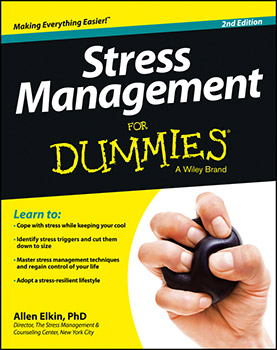Stress Management for Dummies

Ten Habits of Effective Stress Management
By Allen Elkin from Stress Management For Dummies, 2nd Edition
The following qualities are the most important skills and behaviors for reducing stress and creating stress resilience. How many of these describe you? If you can't check off all (or any!) of the items, don't worry " you can change old habits and learn new ones. Managing your stress is not a magical process. It's about mastering new behaviors and finding new ways of looking at yourself and your world.
Know how to relax
You need to know how to let go of tension, relax your body, and quiet your mind. There is no one right way to relax. For some people, meditation, focused breathing, and imagery may be the favored path. Others may prefer a more active approach, with techniques such as progressive muscle relaxation.
Attaining a state of greater relaxation need not be limited to formal approaches. Any activity that distracts you from the stressors of your world can be relaxing. It can take the form of a hot bath, a stroll in the park, a cup of coffee (decaffeinated), or a good book or favorite TV program. All can provide a relaxing escape from stress.
Eat right and exercise often
The foods you eat can play an important role in controlling your stress levels " or making them worse. When you're under stress, you tend to be far less vigilant about what goes into your mouth. You should be eating foods that reduce your stress.
Unfortunately, you're probably craving foods that aren't on anybody's list of healthy choices " sugary foods, fatty foods, and salty foods (not to mention caffeine and alcohol). And even if you manage to eat the 'right" foods, chances are, if you're under stress you will overeat or, at times, under-eat.
Eating the wrong foods can affect how well you deal with stress. Your body needs a balanced, healthy diet to maximize your ability to cope. This means giving your body the right nutrients that supply you with adequate reserves of vitamins, minerals, and other essential elements.
And don't forget about exercise. Engage in some form of physical activity regularly " at least twice a week and, when possible, more often. It can be participating in a sport or working the treadmill. Your exercise regime doesn't have to be fancy or over-done.
Sleep well for less stress
Getting enough sleep is a key element in managing your stress. Too little sleep can leave you tired and drained of energy. Your body and mind aren't prepared to tackle stress. Most people do well on seven or eight hours per night, but individual needs vary.
You can usually tell if you're getting enough sleep if you wake up rested and can get through the day without feeling tired. If you're unsure about how much sleep you need, experiment on the weekend or on vacation, gradually lengthening your sleep time and seeing how much better you feel. By the way, getting too much sleep (more than eight hours) may not be so good for you, either.
Don't worry about the unimportant stuff
Know the difference between what's truly important and what isn't. Put things into perspective. Many " if not most " of life's stressors are relatively inconsequential. One good way of putting things into perspective is asking yourself, 'On a scale of one to ten, how would I rate the relative importance of my stressor?"
Remember that eights, nines, and tens are the 'biggies" " major life problems such as a serious illness, the loss of a loved one, a major financial loss, and so on. Your fours, fives, sixes, and sevens are problems of moderate importance " a lost wallet, a broken-down car, or a broken water heater. Your ones, twos, and threes are your minor worries or stressors " you forget your wallet, your watch battery dies, or you get a bad haircut.
Less anger; less stress
Anger is a stress emotion you can largely do without. Knowing how to avoid becoming angry and losing your temper is a skill well worth mastering. Learning how to control the expression of your anger can also spare you a lot of grief and regret.
Much of your anger comes from various forms of distorted thinking. You may have unrealistic expectations of others (and of yourself!) that trigger anger when they aren't met. Your anger may arise from low frustration tolerance, where you exaggerate your inability to cope with discomfort. You may be 'catastrophizing and awfulizing" or creating some 'can't-stand-it-itis."
Be organized for less stress
It's important to feel a sense of control over your environment. A cluttered and disorganized life leads to a stressed life. Getting organized means developing effective organizational strategies and tools. For many, clutter is the prime culprit. For others, the lack of an organizational strategy becomes the roadblock " where did I file that file?
Manage time efficiently
Know how you spend your time and how you waste your time. Learn to use time effectively. Be in control of your schedule. A good place to start is creating and using organizational lists. By combining to-do lists and your calendar (paper or digital), you have a powerful organizational tool to help you gain control over your time.
To know where your time goes, you may try keeping a simple log, tracking how you use your time. Doing this for even a few days gives you a good picture of what needs to be changed.
A strong support system means less stress
Don't neglect the meaningful people in your life. Spend time with your family, friends, and acquaintances. Have people in your life who listen to you and care for you. If you find that your social support system is a little thin, consider ways of meeting others.
These days, you have no shortage of places to meet others who would like to meet you. The activities can include joining a book group, playing a sport, hiking, walking, or biking, to suggest but a few. Going online can make this process much easier.
Your local church or synagogue can also bring you into contact with people who share your values and goals. And don't rule out a volunteer experience; you can help others and meet new friends.
Live according to your values
Examine your values and goals, assessing whether they truly represent who you are and where you want to go in life. Pursuing values that aren't reflective of the kind of life you want can lead you to an unhappy and stressful place. Ask yourself, 'What do I want to get out of my life? What is truly important to me?"
A good sense of humor de-stresses you
Laugh at life's hassles and annoyances. Be able to laugh at yourself, and don't take yourself too seriously. And remember that bit of wisdom, 'He who laughs, lasts."
RRP: $32.00
MORE
- Tracy Howe Abusive Relationship Interview
- 5 Key Reasons Why People Can't Lose Weight
- Stress Management for Dummies
- Fast Living Slow Ageing
- Greenhouse Capsule
- How to Have a Good Life Crisis
- Guides Say Survey Reveals Alarming Concerns
- Australians Given 100 Reasons to Drop Everything
- Following Your Dreams and Passions
- A Nation of Technology Hoarders
- Belinda Janes
- A Perfect Afternoon
- Garden Jennifer Stackhouse
- Finding The Source Of Your Fears
- When Someone you know Struggles with Fear,...
- Managing the Fear and Anxiety of the Unknown
- Beating the Blues
- Whale Watching Season opens in Newcastle
- Keeping Your Head After Losing Your Job
- Dani Rourke Interview
- Anxiety Free



